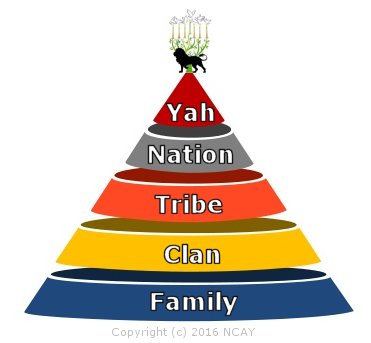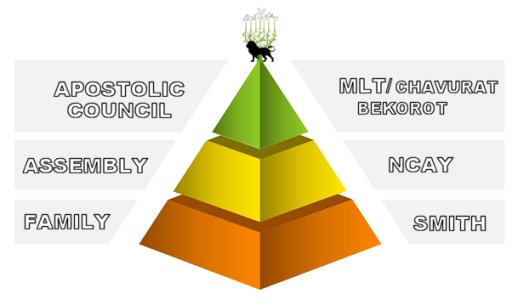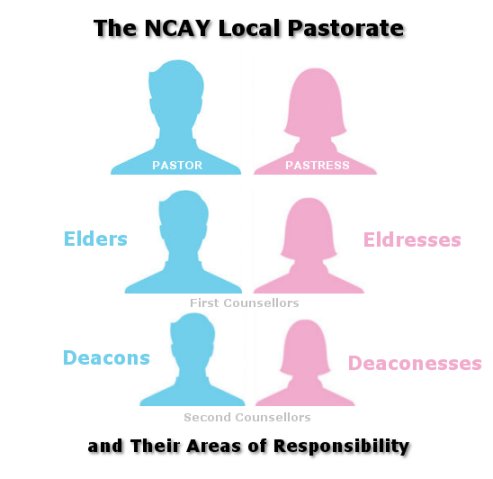
MESSIANIC EVANGELICAL
 Current NCAY Leadership & Callings
Current NCAY Leadership & Callings

An Introduction to Leadership Patterns in Messianic Israel
Leadership in Messianic Israel is according to the divine tavnith or pattern of the New Covenant Melchizedek equivalent of the Israelite Confederacy or Israelite Nation prior to the monarchy of King Saul. Because this is radically different from that of modern Christian churches and Messianic assemblies it is often misunderstood and therefore requires some explanation.
The Family
The basic unit of Messianic Israel is the family. The head and cohen (priest) of each family is, de jure, the father and husband. For this reason he is known as the family's patriarch or 'father-ruler'. His wife (or wives in a larger family arrangement) is his CEO or 'Chief Executive Officer' and operates under his delegated authority within the home and family and is accountable to her husband.
The Wife and Mother
The family mother operates, therefore, as a priestess over her sons (who have not attained to the age of 20, whence they become men, as long as they are still living under their father's roof) and her unmarried daughters in the capacity of a matriarch or 'mother-ruler' under her patriarch-husband. The relationship between father and mother, and husband and wife, is not, as obtains in most churches, one of co-headship but patriarchal. A man's wife is under the authority of no other man. Her husband is accountable for her, and their children, before Elohim (God) and before the Messianic Israelite Community.
The Clan
The second familial tier of Messianic Israel is the clan and its head or cohen (priest) is the most senior member of that clan. A clan is a kinship group that is composed of more than a single family. Not always clearly defined in Scripture, and with some variation in organisation, clans are usually translated as 'divisions,' 'kindred,' 'family,' and sometimes even 'tribe.' Clans are, technically-speaking, subgroups of tribes, and are composed of biological and adopted families.
The Twelve Tribes
There are, or will be, in Messianic Israel, Twelve Tribes, named after the original twelve tribes of Israel, each of which will, at some point, have a territory and a prince or cohen (priest) in the Promised Land after the second and final gathering has taken place at the end of the age. The twelve Tribes as a whole are, according to Scripture, also ruled by a Prince or Cohen (Priest), who is also the Prince of the Tribe of Joseph-Ephraim, the equivalent of a 'Prime Minister', as Joseph was in Egypt. The King and Cohen Gadol (High Priest) of Messianic Israel is the Master Yah'shua the Messiah (Jesus Christ).
The Theocratic Nation
This, then, describes the familial and national organisation of the theocratic state of Messianic Israel as it shall be in the Promised Land and in the Millennium.

The Nation in Diaspora
Because Messianic Israel is in disaspora or dispersion, scattered across the face of the world, it is, for now, organised somewhat differently to the final theocracy.
The End-Time Diaspora Congregation
The basic unit of Messianic Israel in Diaspora remains the family, as already described. A congregation of Messianic Israel in Diaspora (MID) is the voluntary association of patriarchs and their families in a particular geographical area who are networking for evangelism, instruction, fellowship, mutual-support and spiritual growth. We call each of these a New Covenant Assembly of Yahweh (NCAY). Though largely independent, these Assemblies are governed by an apostolic body known as Mishpachah Lev-Tsiyon (MLT) or the Chavurat Bekorot (CB), the primary functions of which are to ensure that the Constitution is adhered to, call Annual General Conferences and to maintain orderly Melchizedek Priesthood governance. All NCAY Pastors are members of MLT which serves as a central congregation for the whole fellowship.

Pastors and Their Selection
The appointment of pastors (overseers) over local congregations or assemblies was historically the responsibility of the apostles. Once true apostles are again called, pastors will be selected by them through revelation. Apostles, unless they fell or retired, served for life. The pastor then selected the remainder of his ministerial team in much the same way as a father-husband makes assignments in his own family unit. Until such a time, though, pastors are selected by the unanimous approval of all the patriarchs having consulted with all the members in a congregation and prayerfully sought the will of Yahweh. Pastors, who must be married, gifted and have some ministerial experience behind them as Elders and Deacons, are unsalaried and serve for one year terms, renewable annually as the Ruach (Spirit) directs.
The Rôle and Selection of the Pastress
The Pastress of a disaspora congregation is ideally and preferably, though not necessarily, the Pastor's wife. As the Pastress is a Melchizedek Priesthood office (an Eldress) like that of the Pastor (who must be an Elder), her rôle in NCAY is not necessarily a default one that comes with being the Pastor's wife. In conservative Evangelical denominations, where there is no concept of a women's priesthood with accountability structures (they do not, unless they are liberal, ordain female pastors, elders and deacons, and then not in the biblical way), Pastor's wives are typically regarded as 'first ladies' as in the American presidential system. This is understandable and reasonable given the system they use. The only reason for a Pastor's wife not being called to be a Pastress would be if she is not in right relationship with Yah'shua (Jesus) or is unqualified to act in a leadership capacity which in NCAY, at any rate, requires her to be able to teach and preach like that of the Pastor.
A Second Selection Method for the Pastress
Another reason a Pastor's wife cannot automatically become the Pastress becomes apparent when you consider those congregations in, for example, Africa and Asia, where plural families are to be found. All the wives cannot be the Pastress. If the Pastor has more than one wife (as was the case not so long ago where one of our Tanzanian pastors had more than one wife), then the Pastress has to be selected by another process - the same, in fact, used in the selection of a Pastress who is not the wife of the Pastor. The Pastress is appointed by the prayerful consent of all the wives of the patriarchs (married men) of that congregation. If the sister thus selected is not the Pastor's wife (or one of his wives) then the husband of the nominee must give his consent to the appointment to ensure that there is proper covering and authority in place. In either case, she must be sustained by all the sisters of the congregation before being ordained.
Eldresses and Mixed Gender Assembly Ministry
The ministry of the Pastress is principally as an Eldress to the women of the congregation in disaspora. However, as already pointed out, she (like other Eldresses) may also be called to preach and teach to a mixed gender assembly provided she is under the proper authority of her husband and has been properly elected and appointed to her ministerial office.
The Pastor's Casting Vote
The Pastor, as the Father or Patriarch of the whole congregation, has the casting vote in all congregational appointments (see the latest Constitution for details), much as the president of a country appoints his cabinet. He will, however, listen carefully and respectfully to the opinions and wishes of his congregation and seek to accommodate these provided they do not contradict the very clear vision he has been given.
The Fully Organised Pastorate
In a fully organised congregation where there are sufficient numbers to warrant it, a full Pastorate may be organised consisting of the Pastor and Pastress with four counsellors, two men and two women (ideally, but not necessarily, married to their opposite numbers), who are appointed by the Pastor and Pastress, in order to share the burden of running a local assembly.

No Perfect System
Obviously in a disapora situation there is no perfect system, since it is an unavoidable compromise between the patriarchal theocratic system of Messianic Israel and the current 'church' system with all its limitations. It is for this reason that a pastor's licence is renewable every year and in part why he is unsalaried. The whole congregation is supposed to share in the ministerial labour, each according to his or her gifting and experience. And ideally there is no clergy-laity division even though practically there will always be a gradient of separation between the the pastors and those who are not yet ordained. In short, it is as families are.
The Final Goal, Families and MLT
The only place where the theocratic system is in full operation is in each family and in the central mishpachah (family) where there is full patriarchy and where the wife (or wives) are de facto and de jure the family pastor's 'pastoral assistant(s)' or pastress(es). Such families, like Abraham's, may consentually adopt other families who then become part of a clan, as described above. Such is how Mishpachah Lev-Tsiyon (MLT) operates which will, in time, be translated into the 12 tribal 'families' when they are gathered. This is Yahweh's tavnith (pattern) and the direction in which we are headed.
Continued in Part 2

This page was created on 19 November 2016
Updated on 10 January 2018
Copyright © 1987-2018 NCAY - All Rights Reserved


